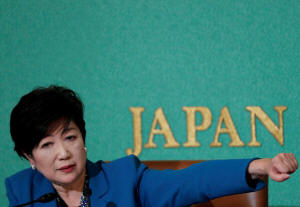|
Run or wait? Tokyo's Koike faces dilemma
ahead of Oct. 22 poll
 Send a link to a friend
Send a link to a friend
 [October 02, 2017]
By Linda Sieg [October 02, 2017]
By Linda Sieg
TOKYO - Tokyo Governor Yuriko Koike has
made no secret of her desire to be Japan's first female prime minister -
she even named her pet terrier "Sori", Japanese for "premier".
But Koike, 65, whose fledgling Party of Hope poses a growing threat to
Prime Minister Shinzo Abe's ruling bloc in an election this month, faces
a tough choice: run now for a seat in parliament so she becomes eligible
for the nation's top job, or wait and bet her party positions itself to
win the next national poll.
Abe called the Oct. 22 poll in hopes his Liberal Democratic Party-led
bloc could keep its majority in the lower house, where it now holds a
two-thirds "super majority", but Koike's party has upended forecasts.
If Koike resigns as governor little more than a year after defying Abe's
LDP to run successfully for that post, she would risk a backlash from
voters. Waiting might let her best shot at the premiership slip through
her fingers.
"If she thinks of the nation, it is important that she boldly announce
her candidacy, present her ideas about important matters ... and debate
policies head on," Abe's ally, Chief Cabinet Secretary Yoshihide Suga,
told reporters on Monday.

Koike, a media-savvy former LDP member and defence minister, has said
she would not resign as governor to run now, especially ahead of the
2020 Olympic Games, which Tokyo will host.
But her carefully phrased remarks have failed to kill speculation that
she will run, perhaps announcing on Thursday, when the Tokyo
Metropolitan assembly ends its session. Candidates must register on Oct.
10, when the campaign officially starts.
Koike is certain to be watching opinion polls as she weighs her
decision.
A TV Asahi survey published on Monday showed 72 percent were negative
about her potential candidacy. A separate NHK poll showed voters were
split on Koike's new party, with about 47 percent having hopes for it
versus the same percentage who had little or no expectations.
Further complicating the election outlook, a senior Democratic Party
executive, Yukio Edano, announced on Monday the formation of a new
Constitutional Democratic Party - with fellow liberals.
"NEXT, NEXT" ELECTION?
Koike's close ally, Masaru Wakasa, on Sunday said it was not essential
that she run this time around.
"If there is a firm prospect of a change in government, party chief
Koike might run for parliament, but if we can achieve a change in the
'next, next' election, she doesn't have to run now," Wakasa said during
a debate on NHK.
Koike, however, has already once blindsided Wakasa, who led efforts to
form the new party, by announcing - on the day Abe announced the snap
poll, that she would lead the Party of Hope herself, not entrust it to
allies.
On Monday, she told Jiji news agency her party aimed to run more than
the 233 candidates needed to take a majority in the 465-seat lower
house. "If you don't buy a lottery ticket, you can't win," she said.
[to top of second column] |

Tokyo Governor Yuriko Koike, head of Japan's Party of Hope, attends
a news conference at the Japan National Press Club in Tokyo, Japan
September 28, 2017. REUTERS/Kim Kyung-Hoon

But she again denied she would seek a seat in parliament now. "I was
in national politics for 24 years and I have no intention to go back
to a place where you can achieve nothing despite spending so much
time," she said.
A former TV announcer who speaks Arabic and English and peppers her
speeches with foreign words, Koike wants to build a "pro-reform,
conservative" party to compete with the LDP, in part by
cannibalizing the failed main opposition Democratic Party and luring
smaller parties to her side.
Her cool, polished demeanor belies a steeliness beneath.
"She can take a punch with a smile and sharpen her knives at the
same time," said Jesper Koll, head of equity fund Wisdom Tree, who
has followed Japanese politics for years.
POPULAR POLICIES
Like former prime minister Junichiro Koizumi, one of her past
mentors, Koike promises to "break free of vested interests", a
slogan that resonates with voters looking for an alternative to the
LDP - although critics question just how different that alternative
would be from Abe's LDP.
To differentiate her party from the LDP, Koike has adopted popular
policies, such as an end to atomic power amid public safety worries
after the 2011 Fukushima nuclear crisis, and proposes to freeze a
planned sales tax hike from 2019.
But she also backs Abe's push to expand the role of the military
overseas and his goal of revising the post-war constitution -
although recently she has avoided focusing on the divisive issue of
amending its pacifist Article 9.

She has also said in the past that Japan should consider having
nuclear weapons, breaking a taboo in the only country to suffer an
atomic attack, and, like Abe, has visited Yasukuni Shrine for war
dead, seen in China and South Korea as a symbol of Japan's past
militarism.
Koike entered politics in a small reformist party and migrated
through several other groups before joining the LDP and in 2008
became the first woman to run for head of the conservative party.
She came in a distant third.
(Reporting by Linda Sieg, with additional reporting by Kaori Kaneko
and Kiyoshi Takenaka; Editing by Ian Geoghegan)
[© 2017 Thomson Reuters. All rights
reserved.]
Copyright 2017 Reuters. All rights reserved. This material may not be published,
broadcast, rewritten or redistributed. |